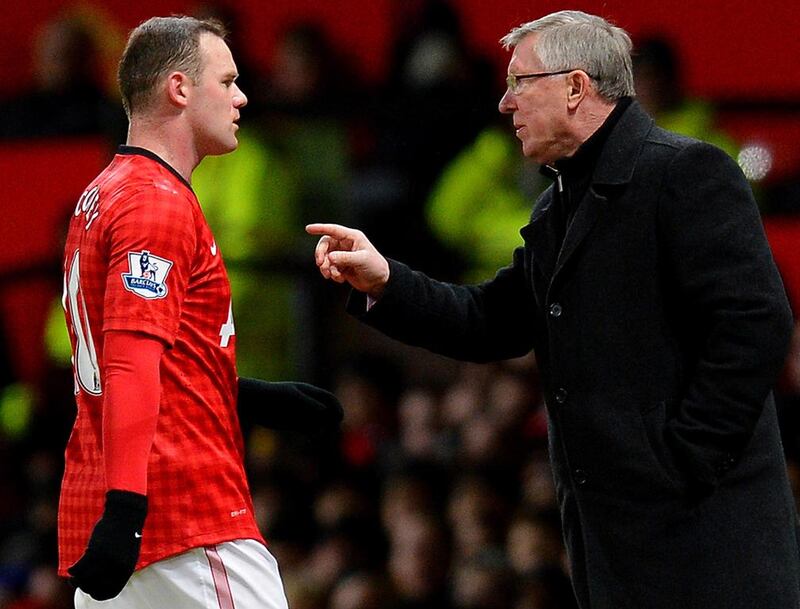Its contents have been kept hidden rather better than many a state secret. They will become clearer around two hours before the press conference with its author begins when the most eagerly-anticipated book of the year will be presented to attendees.
Given the impossibility of reading every observation about his 71 years, or his 49 trophies, in the 416 pages of Sir Alex Ferguson: My Autobiography, the chances are that many will head straight to the index.
They will be looking for shortcuts to any particularly juicy revelations or any especially outspoken comments about many of Ferguson’s friends and foes: Wayne Rooney, Carlos Tevez, David Beckham, Dimitar Berbatov, Roy Keane, Rafa Benitez, Roberto Mancini, Sven-Goran Eriksson, Jose Mourinho, Arsene Wenger, Kenny Dalglish, Luis Suarez.
If the list appears endless, it is partly because Ferguson is the common denominator in English football for the past 27 years and partly because he has a track record of using the written word to settle scores.
His previous autobiography – Ferguson achieved too much for just one – 1999’s Managing My Life was notable for eloquent attacks on former allies. With less reason to placate anyone now he is retired, Ferguson could be still more blunt now.
And yet his latest magnum opus is not about controversy as much as identity. A man with an interest in history is producing the first draft of his own (it is also likely to be the major one while Ferguson lives: biographers have discovered most of his Manchester United charges and assistants are unwilling to talk, so a definitive, impartial work may be impossible in his lifetime).
This is how Ferguson will define himself.
Managing My Life was underpinned by the notion that Ferguson was true to himself and his upbringing in the district of Govan in the Scottish city of Glasgow. Even now his home, south of Manchester in Cheshire, is named Fairfields, after the shipyard where his father worked.
The values he inherited in working-class Scotland in the first half of the 20th century, of community, solidarity and industry were major factors in his success.
Yet that also tallied with the philosophy of his then ghostwriter. Hugh McIlvanney was the outstanding wordsmith of his time, making him Ferguson’s counterpart in sports journalism, and he is also his countryman.
McIlvanney idolised the three greatest Scottish managers of the previous generation – United's Sir Matt Busby, Liverpool's Bill Shankly and Celtic's Jock Stein – and saw Ferguson as their successor.
Busby, Shankly and Stein all used football as their escape from coal-mining backgrounds, while retaining the principles they developed in their youth. Understandably, McIlvanney, another with mining roots, romanticised its significance.
Perhaps, too, Ferguson, was the last of a dying breed: the brilliant British working-class managers. Brian Clough and Don Revie grew up a few streets and a few years apart in Middlesbrough, Bob Paisley and Harry Catterick elsewhere in England’s North-east. Alf Ramsey was from London, Bill Nicholson from Yorkshire, Joe Fagan from Liverpool and Stan Cullis and Ron Saunders from just across the Mersey river.
All 13 were born in a 32-year period, from Busby’s arrival in 1909 to Ferguson’s in 1941 (and, while younger Brits such as Dalglish, George Graham, Howard Kendall and Howard Wilkinson have won the title, typically Ferguson has outlasted them).
If McIlvanney is not alone in feeling Ferguson has most in common with his compatriots, there is a significant difference, and not just because power has swung from managers to players over the past two decades.
Ferguson has been altogether more ruthless than Busby, Shankly or Stein. He has wielded power in dictatorial fashion, overstepped the line with impunity and, since winning 1999’s historic treble, been unaccountable.
Much of what he has done is scarcely attributable to a Govan tenement in the 1940s. The challenge for his new ghostwriter, Paul Hayward, is to find Ferguson’s voice and prove as articulate and persuasive as his predecessor was in arguing his case.
It is no simple task. Results have usually vindicated Ferguson, yet he often speaks in the manner of a man who believes he is morally right. An alternative perspective is that a man who recently said he has never harboured grudges has held as many as he has won games, and there were 895 victories for United alone.
It is a reason for the enduring fascination with him. Ferguson transcended football, let alone the Scottish game that initially occupied his attention. He was recently interviewed by the American television presenter Charlie Rose, an honour more often accorded to Barack Obama or Henry Kissinger.
It is a sign of a change Ferguson has seen in the sport. His autobiography will be an insight into the mind of a manager who had an increasing tendency to hark back to the 1950s and yet won with footballers half a century his junior.
In the process, he became a multimillionaire and a global celebrity. But now, perhaps, we will see who Ferguson believes he really is.
sports@thenational.ae
Follow us on twitter at @SprtNationalUAE






